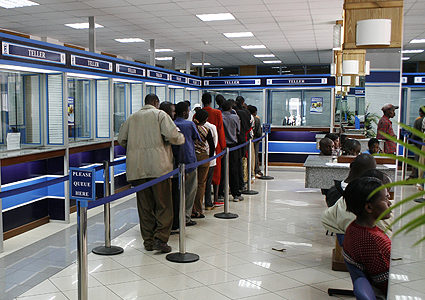A massive influx of customers swarmed banking halls across Nigeria on Monday as they rushed to comply with the Central Bank of Nigeria’s (CBN) recent directive to link their Bank Verification Numbers (BVN) and National Identity Numbers (NIN) to their bank accounts. This surge comes in response to the CBN’s stern warning to banks on Friday, instructing them to restrict account access for customers who have not linked their BVN and NIN.
The CBN’s directive stated that existing customers must ensure all accounts and wallets created through agents are fully profiled in the Nigeria Inter-Bank Settlement System (NIBSS) Integrated Customer Database (ICAD) and tagged with valid BVN and/or NIN. Effective immediately, any unfunded account or wallet will be placed on ‘Post no debit or credit’ until the new process is satisfied. Furthermore, starting March 1, 2024, all funded accounts or wallets will face the same restriction.
“Post no debit” is a term used to describe a restriction imposed by banks that prevents customers from making withdrawals, transfers, or debits from their accounts.
At prominent banking branches such as Zenith Bank, Guaranty Trust Bank, and First Bank, notably at the Ojodu/Berger branches, a significant number of customers formed long queues to link their NIN to their accounts. Despite the high turnout, queues at GTBank remained lengthy even as the day progressed.
Bank officials reported an unusual increase in customer traffic, with some suggesting that if the rush continues, banks may need to extend working hours, including weekends, to accommodate the demand. The CBN’s latest data from the Nigeria Inter-Bank Settlement System revealed that over 75 million bank accounts could face restrictions, given that only 59 million BVNs were registered as of October 9, 2023.
In a related development, the scarcity of local currency notes persisted despite the CBN’s directive to banks to continue accepting old and redesigned naira banknotes. The shortage has led to banks rationing cash to customers in banking halls, while ATMs have been programmed to dispense limited amounts of cash.
Some bank officials attributed the cash scarcity to fears that the CBN may phase out certain old denominations by the year-end. However, the CBN, in response to the concerns, assured the public that all versions of N200, N500, and N1,000 banknotes, both old and redesigned, remain legal tender, as ordered by the Supreme Court.
While some bank spokespeople denied receiving new directives from the CBN regarding cash transactions, the ongoing scarcity is believed to be linked to cash hoarding practices.










